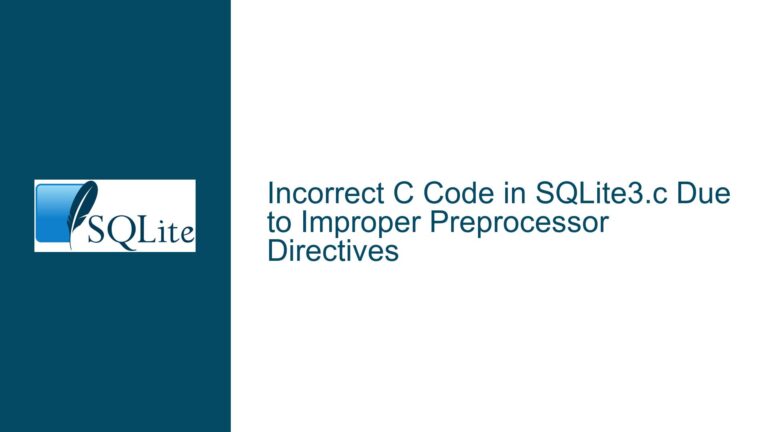Foreign Key Enforcement in SQLite: Why PRAGMA foreign_keys Doesn’t Persist Across Connections
Foreign Key Enforcement Fails After Database Backup or Reconnection
When working with SQLite, one of the most common issues developers encounter is the enforcement of foreign key constraints. Specifically, the PRAGMA foreign_keys setting, which controls whether foreign key constraints are enforced, does not persist across database connections or backups. This behavior can be particularly frustrating when setting up automated testing environments or when transferring databases between systems.
The core issue arises because the PRAGMA foreign_keys setting is tied to the database connection, not the database file itself. When a new connection is established, the default value for foreign_keys is 0 (off), unless explicitly set to 1 (on) within that connection. This means that even if you enable foreign key enforcement in one session, it will not carry over to subsequent sessions or when the database is backed up and restored.
For example, consider a scenario where you create a database schema and enable foreign key enforcement using PRAGMA foreign_keys = ON;. When you query the current state of foreign_keys within the same session, it correctly returns 1. However, if you back up the database using the .backup command and then open the backup file in a new session, querying PRAGMA foreign_keys will return 0. This inconsistency can lead to unexpected behavior, especially in automated testing environments where foreign key enforcement is critical for maintaining data integrity.
Connection-Specific Nature of PRAGMA foreign_keys and Its Implications
The root cause of this issue lies in the connection-specific nature of the PRAGMA foreign_keys setting. Unlike schema definitions or data, which are stored persistently in the database file, certain PRAGMA settings are session-specific. This design choice by SQLite ensures that each connection can operate independently with its own configuration, but it also means that settings like foreign_keys must be explicitly enabled for each new connection.
When you execute PRAGMA foreign_keys = ON;, the setting is applied only to the current connection. It does not modify the database file itself, nor does it influence other connections. This behavior is consistent with other PRAGMA settings that control runtime behavior, such as PRAGMA journal_mode or PRAGMA synchronous. These settings are designed to be flexible and adaptable to different use cases, but they require careful management to ensure consistent behavior across sessions.
The implications of this design are significant, especially in environments where multiple connections are made to the same database or where databases are frequently backed up and restored. For instance, in a Golang application that uses SQLite, each new database connection must explicitly enable foreign key enforcement. Failure to do so can result in foreign key constraints being ignored, leading to potential data integrity issues.
Enabling Foreign Key Enforcement Across Connections and Backups
To address the issue of foreign key enforcement not persisting across connections or backups, developers must adopt strategies to ensure that the PRAGMA foreign_keys setting is consistently applied. Below are detailed steps and solutions to achieve this:
1. Explicitly Enable Foreign Keys in Every Connection
The most straightforward approach is to ensure that every new database connection explicitly enables foreign key enforcement. This can be done by executing PRAGMA foreign_keys = ON; at the beginning of each session. In a Golang application, this can be achieved by executing the PRAGMA statement immediately after opening the database connection. For example:
db, err := sql.Open("sqlite3", "example.db")
if err != nil {
log.Fatal(err)
}
defer db.Close()
_, err = db.Exec("PRAGMA foreign_keys = ON;")
if err != nil {
log.Fatal(err)
}
This ensures that foreign key enforcement is enabled for the duration of the connection. However, this approach requires careful management, especially in applications with multiple database connections or third-party libraries that may not explicitly enable foreign keys.
2. Use a Custom SQLite CLI or Wrapper
If you are using the SQLite command-line interface (CLI) for testing or administration, you can create a custom wrapper script or modify the CLI source code to automatically enable foreign key enforcement. For example, you could create a shell script that sets the PRAGMA foreign_keys option before executing any SQL commands:
#!/bin/bash
sqlite3 "$1" "PRAGMA foreign_keys = ON; .read $2"
This script takes two arguments: the database file and the SQL script to execute. It ensures that foreign key enforcement is enabled before running the script. Alternatively, you could modify the SQLite CLI source code to enable foreign keys by default, although this approach requires familiarity with the SQLite codebase and may not be suitable for all users.
3. Compile SQLite with Foreign Keys Enabled by Default
For advanced users, another option is to compile SQLite with foreign key enforcement enabled by default. This can be done by setting the SQLITE_DEFAULT_FOREIGN_KEYS compile-time option to 1. When SQLite is compiled with this option, foreign key enforcement is automatically enabled for all connections, eliminating the need to set the PRAGMA manually.
To compile SQLite with this option, you would need to download the SQLite source code and modify the sqlite3.c file or the build configuration. For example:
#define SQLITE_DEFAULT_FOREIGN_KEYS 1
#include "sqlite3.c"
After compiling SQLite with this option, all connections to the database will enforce foreign key constraints by default. However, this approach is only feasible if you have control over the SQLite build process and can distribute the custom binary to all users and systems that need it.
4. Automate PRAGMA Execution in Testing Environments
In automated testing environments, you can use tools or scripts to ensure that foreign key enforcement is enabled before running tests. For example, if you are using a testing framework that supports setup and teardown methods, you can include the PRAGMA foreign_keys statement in the setup phase. This ensures that foreign key enforcement is enabled for all test cases.
For example, in a Python-based testing framework, you could use the following setup method:
import sqlite3
def setup_database():
conn = sqlite3.connect('test.db')
conn.execute('PRAGMA foreign_keys = ON;')
return conn
def teardown_database(conn):
conn.close()
This approach ensures that foreign key enforcement is consistently applied across all test cases, reducing the risk of data integrity issues.
5. Document and Enforce Best Practices
Finally, it is essential to document and enforce best practices for enabling foreign key enforcement in your development and testing workflows. This includes educating team members about the connection-specific nature of the PRAGMA foreign_keys setting and providing guidelines for ensuring consistent behavior across connections.
For example, you could create a checklist for database initialization that includes enabling foreign key enforcement as a mandatory step. Additionally, you could use code reviews and automated linting tools to ensure that the PRAGMA foreign_keys statement is included in all database connection code.
Summary of Solutions
| Solution | Description | Pros | Cons |
|---|---|---|---|
| Explicitly Enable Foreign Keys | Execute PRAGMA foreign_keys = ON; in every connection. | Simple and straightforward. | Requires manual management in all connection code. |
| Custom SQLite CLI or Wrapper | Create a script or modify the CLI to enable foreign keys automatically. | Ensures consistent behavior in CLI usage. | Requires additional setup and maintenance. |
| Compile SQLite with Default Foreign Keys | Compile SQLite with SQLITE_DEFAULT_FOREIGN_KEYS set to 1. | Eliminates the need for manual PRAGMA execution. | Requires control over SQLite build process. |
| Automate PRAGMA Execution in Testing | Include PRAGMA foreign_keys in test setup methods. | Ensures foreign key enforcement in tests. | Limited to testing environments. |
| Document and Enforce Best Practices | Provide guidelines and enforce foreign key enforcement in workflows. | Promotes consistent behavior across teams. | Relies on adherence to guidelines. |
By understanding the connection-specific nature of the PRAGMA foreign_keys setting and implementing one or more of the above solutions, you can ensure that foreign key enforcement is consistently applied across all database connections and backups. This will help maintain data integrity and prevent unexpected behavior in your SQLite-based applications.






